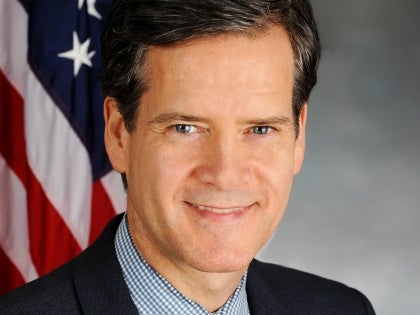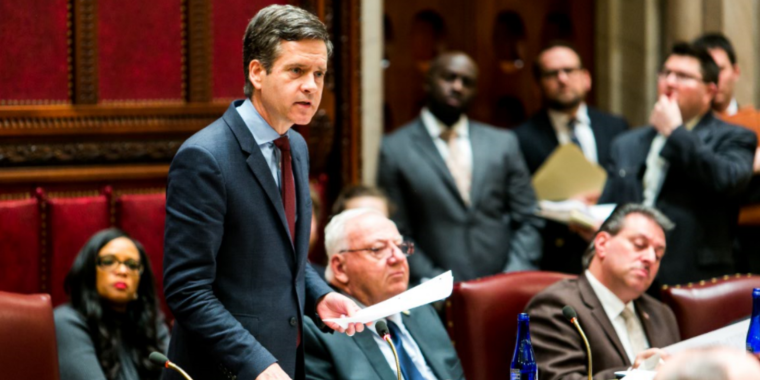
Testimony of State Senator Brad Hoylman Before the New York City Council Committee on Housing and Buildings
April 20, 2017

Thank you for the opportunity to testify today in support of legislation to strengthen and expand tenant protection in New York City. My Senate District includes Clinton/Hell’s Kitchen, Chelsea, Greenwich Village, the Upper West Side, Midtown/East Midtown, the East Village, and Lower East Side. The residential parts of my district are mixed income and composed largely of tenants, thousands of them rentregulated, both in small buildings and iconic rental complexes, including Stuyvesant Town-Peter Cooper Village, London Terrace Gardens, Westbeth, and Phipps Plaza. While New York has always struggled to protect tenants and tenancy from unscrupulous actors, the last several years have been marked by a dramatic uptick in flagrant tenant harassment, abuse and neglect in my district and across the city. I cannot think of anything more important than putting all of our energy behind the effort to reverse this trend and hold responsible parties accountable. As such, I thank Council Member Jumaane Williams, Chair of the Committee on Housing and Buildings, for hosting today's hearing. I also want to thank Speaker Mark-Viverito and Council Members Chin, Garodnick, Kallos, Levine, Menchaca, Mendez, Reynoso, Rosenthal and Torres for their sponsorship of the important legislation under consideration today.
The 14 bills before you today can be broadly divided into four categories: expanding what constitutes tenant harassment, increasing transparency for tenants living in scenarios that frequently result in harassment, increasing the financial consequences for bad actors, and creating additional oversight mechanisms for city government so as to prevent harassment before it begins. These are smart, tough and potentially very effective directions towards which New York City can and should move. I am particularly concerned about the future of tenants in my district for a number of reasons. The 27th Senate District contains more AirBnB rentals than any other in the State Senate, which dramatically increases the incentive to pressure tenants out of their homes and makes it less safe and comfortable for those tenants who remain. I have the dubious distinction of representing the only Senate District to which the new 421-a program applies in its entirety, and I am very concerned that it will increase pressure and incentives to build and renovate luxury units in place of current rent regulated buildings. Finally, my office has been working with the tenant coalitions from a number of infamous bad actor landlords with large portfolios, such as Croman and Toledano. Many of these bills, if passed into law, would be of genuine and immediate help in the fight to protect and defend my constituents in those buildings.
Intros 1530-2017 and 1551-2017 would create rebuttable presumptions of tenant harassment when an owner either commits or omits at least one act that qualifies as harassment without requiring proof of intent to force the tenant to vacate, or when an owner includes non-rent fees on a rent bill. In a Toledano-owned building in my district, tenants have been without gas for so long that it began in the spring, continued through Thanksgiving, robbing them of the simple right to have a Thanksgiving meal at home, and continues to this day. If the lawyers and advocates working with these tenants were able to begin with a rebuttable presumption that this level of neglect constituted harassment, it could have altered the course of events long before my constituents were robbed of their holidays and daily comfort.
Intro 1548-2017 and 1549-2017 would expand the definition of tenant harassment to include repeatedly contacting or visiting a tenant at unusual hours as well as qualifying landlord conduct as "repeated" for the purpose of meeting the requirements for harassment, even if that conduct is directed at different tenants. As we all know too well, these are routine tactics favored by unscrupulous landlords looking to intimidate and scare tenants without technically crossing any legal boundaries. Steve Croman has been filing multiple court cases against tenants that are proceeding to this day, even as he is under indictment by Attorney General Schneiderman for felony harassment. If behavior targeting a tenant in two different Croman buildings could legally constitute repeated harassment, many of these cases might have been non-starters. Moving the goal post here is appropriate and thoughtful, and sends the message that New York City government is learning and prepared to be flexible in defense of our citizens. Intro 1550-2017 sends the same important message by expanding the reach of tenant harassment statutes to private dwellings.
Intros 0936-2015, 0938-2015 and 0960-2015 aim to increase transparency about the process of construction in inhabited dwellings towards the goal of reducing constructive harassment. By mandating a clear, precise and easily accessible Tenant Protection Plan, creating a watchlist of contractors recently engaged in unpermitted work, and creating a construction bill of rights, we would be empowering New Yorkers to stand up for themselves and act as experts in their own experiences so as to better advocate for their safety and rights. Sunlight is almost always the best disinfectant, and I am very hopeful that these three bills could do tremendous good for my constituents.
Intros 0931-2015, 0003-2014, 1556-2017 and 0347-2014 rightly aim to sharpen the financial consequences of behavior that damages the safety and security of all our constituents. I am proud to sponsor, along with Assemblymember Rosenthal, a bill at the state level that would increase fines by orders of magnitude for overcharging rentstabilized or controlled tenants, and glad to see similar legislation at the city level for tenant harassment. Increasing the penalties for tenant harassment is not only sensible, but gives further bite to a potential lien for unpaid penalties and will help prevent violations from being an unremarkable cost of doing business for wealthy bad actors. Too often ECB violations go unpaid for years or indefinitely, making a mockery of our laws and the work all our offices put into upholding them; enabling unpaid ECB violations to convert into tax liens would not only send a powerful message to bad actors, but also dramatically increase revenues collected by the city, which could be used for other safety and wellbeing initiatives. Requiring that owners who behave so poorly as to require the forcible vacating of tenancy pay back the city for those relocation costs in a clear and structured manner is eminently reasonable and just.
Finally, it is high past time to allow judges in Housing Court to assess statutory, compensatory and punitive damages against unscrupulous owners where appropriate. Frivolous lawsuits against tenants are another cost of doing business for bad landlords, and while they do technically constitute harassment, the steps required for penalizing this behavior are often prohibitive. Enabling Housing Court judges to address this behavior directly would strongly disincentivize such actions. For too many of our constituents, Housing Court is an asymmetrical nightmare where they can only play defense while owners play offense. It is time to end this asymmetry immediately. Finally, Intros 0926-2015 and 1523-2017 would create new mechanisms of oversight towards the goal of stopping tenant harassment before it begins. As the saying goes, an ounce of prevention is worth a pound of cure, and this is true in housing as well, which is an integral aspect of people's health and wellbeing. In Chelsea, there is a plague of illegal demolitions in the Special District that has cost us affordable housing units with no course for redress or replacement. If a Tenant Advocate were in DOB when those illegal permits were filed, and if there were an inter-agency taskforce responsible for managing occupied construction sites, we would very likely still have those affordable housing units today. These steps would allow us to catch problems before they begin and have a proactive role in keeping New Yorkers healthy and happy in their homes.
I appreciate your time and consideration, and thank you again for the opportunity to comment.